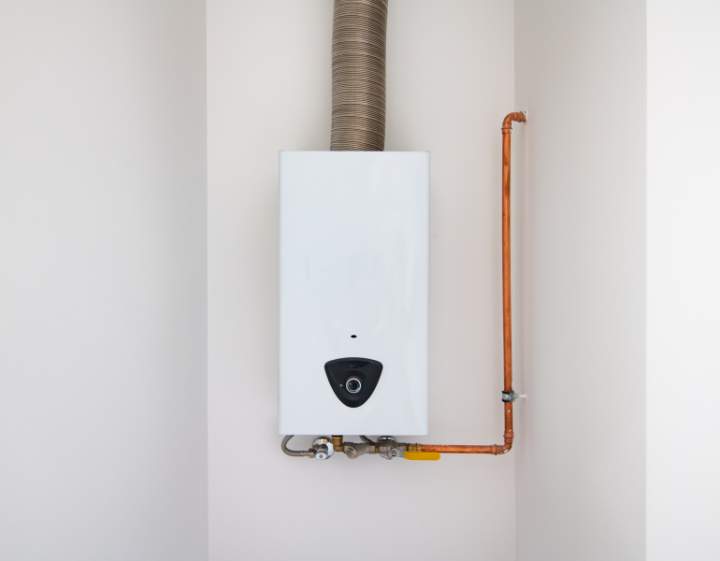Introduction
Gas tankless water heaters offer an efficient and cost-effective solution for providing hot water in homes. Unlike traditional tank heaters, which store and continuously heat a large volume of water, tankless heaters heat water on-demand, eliminating the need for a bulky storage tank. This design not only saves valuable space but also reduces energy consumption significantly.
One of the key benefits of a gas tankless water heater is its ability to provide an endless supply of hot water. With a tankless system, there is no risk of running out of hot water, making it ideal for large households or households with high water demand. However, to ensure the optimal performance and longevity of a gas tankless water heater, regular maintenance is crucial. Proper maintenance includes both do-it-yourself tasks and professional inspection to address any potential issues. By performing routine maintenance, homeowners can maximize the heater’s efficiency, prevent breakdowns, and extend its operational life.
In the following sections, we will discuss the essential maintenance tasks for gas tankless water heaters, detailing both DIY steps and the importance of professional involvement. By following these guidelines, homeowners can enjoy the benefits of a reliable and efficient gas tankless water heater for years to come.
Understanding Your Gas Tankless Water Heater
Gas tankless water heaters are an efficient and popular choice for many homeowners due to their ability to provide hot water on demand. Unlike traditional tank water heaters, which continuously store and heat water, tankless heaters only heat water as it is needed. This process is achieved through the use of a heat exchanger, which rapidly heats the water to the desired temperature.
Maintenance of your gas tankless water heater is crucial to ensure optimal performance and safety. Over time, mineral deposits can accumulate inside the heat exchanger, causing reduced efficiency and potential damage to the unit. Additionally, burner blockage can occur from dirt or debris, impeding the heater’s ability to ignite and heat water effectively. To prevent these common issues, regular maintenance is necessary. Homeowners can perform simple maintenance tasks, such as flushing the heat exchanger annually to remove mineral buildup. This can be done by following the manufacturer’s instructions and using a descaling solution or vinegar. Furthermore, it is important to keep the area around the heater clean and clear of any debris to prevent blockage of the burner. While DIY maintenance is important, it is also essential to have a professional inspect and service your gas tankless water heater regularly. Professionals have the expertise to identify potential issues, clean components more thoroughly, and ensure overall system safety.
By understanding the operation of your gas tankless water heater and the importance of maintenance, you can ensure that your system functions efficiently and provides a continuous supply of hot water for your home.
Essential Maintenance Practices
- Annual Inspection
It is highly recommended that homeowners schedule an annual inspection for their gas tankless water heaters conducted by a professional technician. This annual check-up plays a crucial role in maintaining optimal performance and safety of the unit.
During the inspection, the technician will thoroughly examine various components of the water heater to ensure its proper functioning. One of the key areas of focus is the heat exchanger. This important component heats the water as it passes through, and any damage or malfunction can lead to inefficient heating or even carbon monoxide leaks. The technician will inspect the heat exchanger for cracks, corrosion, or any signs of deterioration. Additionally, the water filter will be inspected and cleaned if necessary. Over time, mineral deposits and sediment can accumulate in the water filter, affecting the flow and quality of the water. The technician will remove any build-up and ensure that the filter is working effectively. Furthermore, the overall condition of the unit will be assessed. The technician will check for any visible signs of wear and tear, such as loose connections, faulty valves, or corroded pipes. Any potential issues will be identified and addressed, safeguarding the water heater from further damage.
An annual inspection by a professional technician is crucial for homeowners with gas tankless water heaters. It ensures that the unit is operating efficiently, minimizes the risk of leaks or other problems, and prolongs the lifespan of the water heater.
- Regular Flushing
Regular flushing is essential for maintaining the optimal performance of a gas tankless water heater. Over time, mineral build-up, especially in areas with hard water, can cause significant issues with the system’s efficiency. The mineral deposits can clog the water flow, decreasing the heater’s ability to effectively heat water and resulting in increased energy consumption.
To combat mineral build-up, a regular flushing process should be implemented. This process involves removing the accumulated mineral deposits from the heat exchanger and other components of the water heater. Flushing can either be done as a DIY project or scheduled with a professional service. For the DIY approach, homeowners can follow a step-by-step guide to flush the system effectively. This typically involves shutting off the gas and water supply, connecting a hose to the unit’s flushing port, and running a vinegar or descaling solution through the system. The flushing process is typically repeated until the water runs clear and free of any mineral deposits. After flushing, it is crucial to properly reconnect all hoses and restore the gas and water supply to the unit. If homeowners are uncomfortable or inexperienced with performing the flushing themselves, it is recommended to schedule a professional service. Professional technicians have the expertise and proper equipment to effectively flush the system and ensure optimal performance and safety. Regular flushing, whether done DIY or with professional help, is crucial for maintaining the efficiency and longevity of a gas tankless water heater.
- Filter Cleaning
Regularly cleaning the air intake filter of your gas tankless water heater is crucial to ensure its efficient operation. Over time, the filter may accumulate dust, debris, and other particles, which can hinder proper air intake and affect the heater’s performance. By following the manufacturer’s guidelines, you can easily clean or replace the filter to maintain optimal functioning. Begin by locating the air intake filter on your gas tankless water heater. It is typically located on the bottom or side of the unit. Once you have identified the filter, turn off the heater and disconnect any power supply. Next, gently remove the filter from its housing. If it is a reusable filter, use a soft brush or vacuum cleaner with a brush attachment to remove the accumulated dirt and debris. Be careful not to damage the filter. If the filter is disposable, simply discard it and replace it with a new one according to the manufacturer’s recommendations. After cleaning or replacing the filter, ensure it is securely placed back into its housing. Make sure there are no gaps or loose fittings that may allow unfiltered air to enter the heater.
Regularly checking and cleaning the air intake filter of your gas tankless water heater can significantly improve its performance and extend its lifespan. It is a simple yet essential maintenance task that homeowners should prioritize to ensure the heater operates efficiently and safely.
- Checking for Error Codes
When it comes to maintaining a gas tankless water heater, one crucial aspect is to regularly check for error codes that may be displayed on the unit. These error codes serve as diagnostic tools that can help homeowners identify any potential issues or malfunctions with their heater.
To check for error codes, homeowners should first turn off the heater and refer to the manufacturer’s manual. The manual will provide a list of error codes and their corresponding meanings. Each error code is typically displayed on the heater’s digital screen or LED lights. Interpreting error codes correctly is essential to determine the appropriate course of action. For some basic error codes, homeowners may be able to troubleshoot and resolve the issue themselves. This could involve simple tasks such as cleaning or replacing a filter, checking gas or water supply, or resetting the unit. However, if the error code indicates a more complex problem, it is advisable to contact a professional technician. Attempting to fix intricate issues without the necessary expertise may lead to further damage or pose safety risks.
Regularly checking for error codes can help homeowners catch any potential problems early on, ensuring the heater’s optimal performance and safety. Following the manufacturer’s guidelines and contacting professionals when needed are essential for effective maintenance of gas tankless water heaters.
- Ventilation System Maintenance
Maintaining proper ventilation is crucial for ensuring the optimal performance and safety of your gas tankless water heater. A well-functioning ventilation system allows for the proper expulsion of harmful gases and promotes adequate air circulation around the unit. Regularly checking and cleaning the vent pipes is a vital aspect of ventilation system maintenance. Inspect the pipes for any blockages, leaks, or signs of corrosion. Blockages, such as dirt, debris, or even pests, can hinder the proper functioning of the ventilation system and may lead to issues like carbon monoxide buildup or poor combustion. Leaks in the vent pipes can cause water damage and also compromise the efficiency of your gas tankless water heater. If you notice any leaks, it is essential to promptly address them by repairing or replacing the affected pipe. Corrosion on the vent pipes can occur due to exposure to moisture or acidic condensation. It is crucial to examine the pipes for signs of rust or deterioration. If you spot any corrosion, it is recommended to consult a professional to assess the extent of the damage and take appropriate action.
Regularly inspecting and maintaining the ventilation system of your gas tankless water heater will not only ensure its optimal performance but will also contribute to the safety of your home and well-being of your family. For complex issues or professional assistance, it is advisable to seek the expertise of a qualified technician who can effectively address any concerns regarding the ventilation system.
Long-Term Care Tips
Proper maintenance is crucial for ensuring the longevity and efficient performance of gas tankless water heaters. Follow these long-term care tips to keep your system running smoothly:
1. Regular Flushing: Flushing your tankless water heater once a year removes mineral deposits and debris that can accumulate over time, improving its efficiency and preventing damage to the heat exchanger.
2. Check for Leaks: Perform regular checks for leaks in the water and gas lines. Leaks can cause serious damage and reduce the effectiveness of your water heater.
3. Clean the Air Intake and Exhaust: Inspect the air intake and exhaust vents regularly for dust, debris, or blockages. Clean them to ensure proper airflow and prevent overheating.
4. Inspect and Test Safety Features: Check the pressure relief valve and temperature sensor periodically to ensure they are functioning correctly. These safety features are crucial for preventing excessive pressure build-up and overheating.
5. Monitor and Adjust Water Temperature: Keep an eye on your water heater’s temperature settings and adjust them according to seasonal needs. Lower temperatures in summer can save energy, while higher temperatures in winter ensure hot water availability.
By following these long-term care tips, homeowners can ensure optimal performance, energy efficiency, and safety of their gas tankless water heaters. However, for complex maintenance tasks or repairs, it is always recommended to seek professional assistance.
When to Call a Professional
When it comes to maintaining a gas tankless water heater, there are certain maintenance tasks and issues that should be handled by a professional to ensure safety and proper handling. These complex issues typically require specialized knowledge and tools that homeowners may not possess. One instance when it is crucial to call a professional is when dealing with any gas-related problems. Gas leaks or issues with gas lines can be extremely dangerous and should never be tackled by a homeowner. A qualified technician will have the expertise to assess and address these issues safely. Additionally, if the water heater is not functioning properly despite basic troubleshooting, it is best to call in a professional. This could signify a more complex problem that requires expert diagnosis and repair.
Establishing a regular service contract with a reliable provider is highly beneficial for the maintenance of a gas tankless water heater. With a service contract, professionals can inspect, clean, and tune up the system on a regular basis, ensuring it operates at its best efficiency and prolonging its lifespan. Regular maintenance can also help identify and address any potential issues before they become major problems. Certain maintenance tasks and issues with gas tankless water heaters should always be handled by a professional for safety reasons. Establishing a service contract with a reliable provider will help homeowners maintain optimal performance and ensure the longevity of their gas tankless water heaters.
Conclusion
Maintaining a gas tankless water heater is essential for both efficiency and longevity. Regular maintenance not only ensures that the unit operates at its peak performance, but it also helps to prevent costly repairs in the future. By taking the time to clean the unit, check for any leaks or malfunctions, and flush the system as necessary, homeowners can avoid potential problems and extend the lifespan of their gas tankless water heater.
It is important to remember that while there are certain maintenance tasks that can be done by homeowners themselves, such as changing filters and flushing the system, it is also crucial to involve professionals for more complex issues. Regular inspections by qualified technicians can help identify any underlying problems early on and address them before they become major and costly issues.
By properly maintaining a gas tankless water heater, homeowners can enjoy the benefits of efficient and continuous hot water while ensuring the safety and longevity of their unit. It is a small investment of time and effort that can lead to significant savings and peace of mind in the long run. So, make it a priority to prioritize the maintenance of your gas tankless water heater and reap the rewards it brings.






